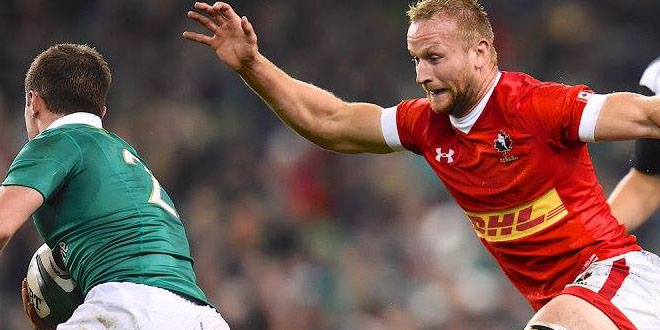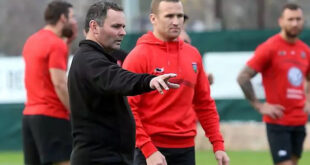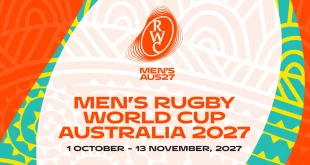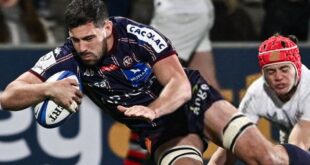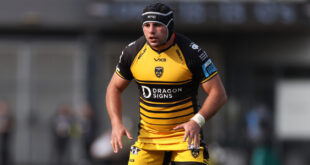When he’s not busy throwing his body in front of small buses disguised as human beings, Matt Heaton can often be found moving heavy inanimate objects on iron bars. A casual glance at his social media postings will tell you that the hours required in the gym by a professional rugby player are not ones of toil and loathing for the Canadian flanker.
“I absolutely love it. I think it’s the competitive side of it that I like. I qualified as a personal trainer and coached Crossfit for a couple years when I lived in Leeds. Unfortunately I don’t get to do much fitness instructing these days.
“My spare time at DMP [Darlington Mowden Park] actually consists of coaching rugby at Queen Elizabeth Sixth Form College. The club runs an academy through the school and a few players coach there, myself being one of them.”
If a post-rugby career in coaching or personal training isn’t on the cards, Heaton might have another calling. A passionate music fan, he recalls his introduction to the world of DJing.
“It’s a funny story how I learned to DJ. I had moved out west to train in Langford for the u20’s. I trained at the Centre of Excellence in the morning and played club rugby in Victoria. When I first moved out there I didn’t get a job right away and had loads of spare time.
“I think it was Justin Douglas who actually said ‘if we actually used our spare time productively and tried to learn something we’d master it in no time.’ From then on we said we’d practice something for an hour a day. I think Charles Debove chose dancing, Lucas Hammond wanted to learn Spanish, and I said I wanted to learn how to DJ.
“So I spent an hour a day watching DJ’s mix sets and learned all the terminology and programs and equipment etc. Eventually I bought a mixer and started DJing at house parties and small events. I don’t do it much anymore as I don’t have much time for it now.”
His focus these days is on rugby. For the past two seasons he’s been at Darlington Mowden Park, a semi-professional outfit in England’s third division, National One. Before that it was Otley in National Two, and before that a short stay with Bridgend Athletic, a small club halfway between Cardiff and Swansea that kicked off Heaton’s overseas journey after playing for Canada ‘A’ in the old version of the Americas Rugby Championship in October 2013.
“I was playing club rugby at Ste-Anne-de-Bellevue and that summer we had a few Welsh guys come over. I became really good friend with one of them almost instantly. [Canada Forwards Coach] Mike Shelley was trying to get me over to the UK to play and train with Leeds but it was proving more difficult than we thought.
“Eventually my Welsh mate just said I should come play for his club in Bridgend, so after the ARC in Langford I packed my bags and moved to Wales without a plan or anything really. It took me a little while to get on my feet and eventually I moved to Leeds but I absolutely loved my time in South Wales.”
While it may have been an unplanned excursion that brought him to the UK, Heaton’s rugby progression has been methodical. It began as a 14-year-old with Ormstown Saracens, a short drive from his home town of Godmanchester, Quebec. He was then enrolled at John Abbott College, and made the switch to SABRFC where he would be coached by a fellow named François Ratier.
A sport spell with James Bay in Victoria followed but Heaton is a rare jewel in Canadian rugby, a player whose formative rugby education came in his home province of Quebec. Martial Lagain and Benoît Pifféro in the current squad have both played club rugby in the province, but both played the majority of their rugby in France.
“I’m proud to be a Québécois on the team even if I’m Anglophone,” he laughs. “I think it shows that If you’re good enough it shouldn’t matter where you’re from. I learned the majority of my rugby in Quebec and I had a lot of good coaching in Quebec. Hopefully as Canadian rugby grows we start to see more guys from non traditional rugby hotbeds.”
Despite playing regularly at a level higher than anything available in Canada, Heaton spent more than two years in the international wilderness, biding his time before at last being selected to the senior Canadian squad in June of 2016. He remembers getting ‘the call’, another humorous event that wasn’t quite part of the script.
“I was at the office at the Crossfit gym I was coaching at. Mike Shelley e-mailed me to see what I was doing and if I could come to camp. I’m pretty sure I told my girlfriend first, she wasn’t happy to be honest.
“I’d had so many e-mails in the previous years saying I was on the long list for tours but never getting selected so I wasn’t too excited about the idea. Also I was playing for the Rock in the CRC [Canadian Rugby Championship] that summer and it would mean I was on the road for longer. I’m glad I sucked it up and went to the camp in hindsight.”
Now just a few days away from his 25th birthday, Heaton is approaching the peak of his powers. He won his first test start against Romania in November of that year and has started every match since for Canada outside of the ARC. In 2017 he took another step forward, earning a Player of the Year nomination for the upcoming annual Rugby Canada awards. His performance against Spain in November of last year was outstanding, but Heaton insists there hasn’t been any secret formula to his progress.
“To be honest it’s just not thinking too much about it. I used to get myself so nerved up on the bench or the day of the game thinking about what I needed to do and about playing my best and bringing loads of energy, so much so that I’d burn myself out or come on and do something stupid. I found that if I just went out and trusted my ability and played my game I had a much better time and a much better performance.”
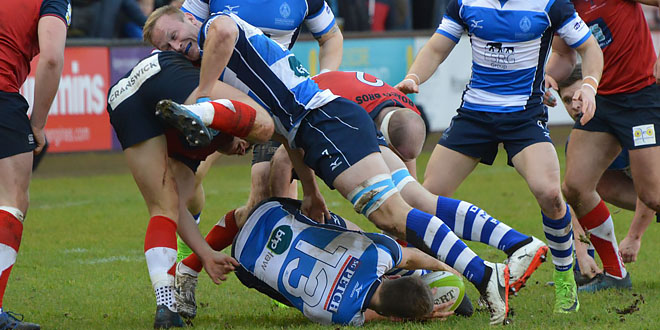
His next move professionally is unclear. For the moment he’ll concentrate on finishing out the season with Darlington Mowden Park. A European passport, courtesy of his German mother, means that he isn’t classified as an overseas player in employment terms. It removes a significant hurdle often encountered by Canadian players without one but Heaton admits that moving further up the ladder from here is difficult for an openside flanker, a position often reserved for locals.
The Aviva Premiership, for example, rewards clubs for fielding English-qualified players. Across the 12 teams in the division only a half-dozen players who might be considered openside specialists are not eligible to represent England – three Springboks, one Scottish international, one Welsh cap, and the USA’s Andrew Durutalo. The latter is not considered first choice at Worcester.
“Especially being a number seven you tend to lose your spot because it isn’t really seen as a skilled position. Most teams can play anyone there and get by. In terms of where I want to be, I want to play as high a standard as I can. I’m a competitive guy so challenging myself to do the best I can means trying to play top flight rugby so that I can get better.”
Flankers in the Premiership come in various shapes and sizes but the majority of opensides tend to fall between 105-108 kg (230-240lbs). Against monster packs like Georgia and Romania, Heaton’s athletic build closer resembled a midfield back than that of a lumbering forward. That’s after noticeably packing on muscle to his current weight of 101kg (220lbs).
“It’s a style of game thing I think. I’m naturally pretty lean and have a good work rate so the extra weight just wouldn’t suit me. I’ve had a lot of pressure on me in the past to get bigger for men’s rugby which I did but at my own pace.
“Some teams prefer a big openside to carry hard and some prefer a smaller one who can get around easier. Being a smaller athlete against the bigger pack just means I need to be more technical. I’m a leg tackler and if I do them well it stops anyone no matter how big. I don’t ever see myself ever getting bigger than 103kg (225lbs), it just wouldn’t fit on my frame.”
While he will have some decisions to make on his club future soon enough, in his immediate sights are the Americas 2 World Cup Qualifiers against Uruguay. The first of two matches takes place on Saturday at Vancouver’s BC Place. It’s a situation Canada would have preferred to have been watching rather than playing. The memories of the catastrophic match in San Diego are still painful.
“It was a tough pill to swallow. The hardest bit was seeing my family after the game. I couldn’t look them in the eyes. I felt like I’d let them down.”
Fast forward six months and the team has a new coach in Kingsley Jones and reinvigorated spirit in spite of the rough go last year. Heaton says the difference is mainly one of attitude.
“There is a real buy-in this time. I don’t think we really believed in what we were doing for the USA tests. The whole atmosphere was bad. I didn’t like being on tour if I’m honest, it just didn’t feel right. We’ve got the winning formula now, we work hard and enjoy our time together. Canadian rugby is evolving and I’m happy to be involved during this change.”
“Kingsley goes about things a bit differently. He’s very positive and enables the players quite a bit. We had a blame culture before, now I think we have a ‘How can we do this better?’ culture.”
Heaton will be starting in his usual No7 jersey against Uruguay on Saturday, but will do so with his mates Kyle Baillie and Shane O’Leary. Baillie was the other half of the flank-duo that was so effective in the win over Spain while O’Leary is unquestionably Canada’s best flyhalf. Also missing for at least this weekend will be Matt Tierney, with long-term absentees in Ciaran Hearn, Conor Trainor, Andrew Coe, and Matt Evans. If a World Cup squad were named tomorrow and every player fit, all would be expected to be named in it. To say the timing is unfortunate would be an understatement.
“It’s the nature of the game. It forces other players to put their hands up and show they have what’s needed for the team. Obviously we want everyone fit at all times but we just need to focus on the task at hand and trust that whoever is doing the job will do it to the best of their ability.”
As for the team in the headlights, Heaton is looking forward to the challenge but isn’t looking past the first match in Vancouver. For Canada’s flourishing flanker it’s business as usual. One step at a time.
“I think we’ll face a team similar to what we faced in Spain, passionate and aggressive. They will play well as a team and won’t give up for 80 minutes. We want to win on home soil and build on that for a tough away test down in Uruguay.”
 Americas Rugby News Rugby news from across the Americas!
Americas Rugby News Rugby news from across the Americas!
